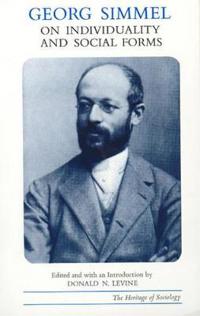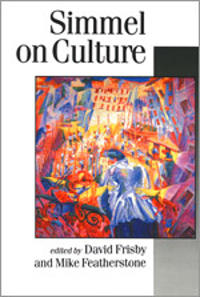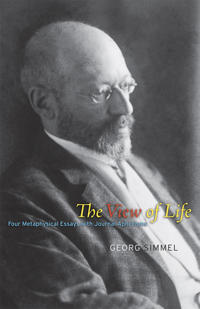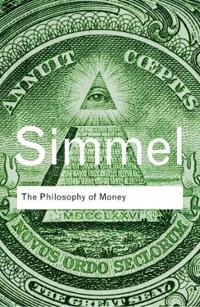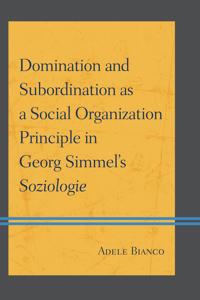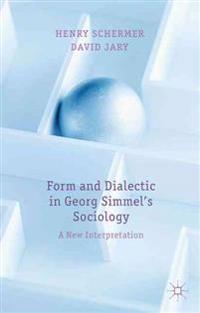Georg Simmel on Individuality and Social Forms (Pocket)
avGeorg Simmel
ISBN: 9780226757766 - UTGIVEN: 197106"Of those who created the intellectual capital used to launch the enterprise of professional sociology, Georg Simmel was perhaps the most original and fecund. In search of a subject matter for sociology that would distinguish it from all other social sciences and humanistic disciplines, he charted a[...]
Simmel on Culture: Selected Writings (Inbunden)
avGeorg Simmel, David Frisby, Mike Featherstone
ISBN: 9780803986510 - UTGIVEN: 1998-01The German sociologist and philosopher Georg Simmel (1858-1918) is recognized as a leading early twentieth-century European social theorist. This collection enables the reader to engage with the full range of Simmel's dazzling contributions to the study of culture. It opens with Simmel's basic essay[...]
Schopenhauer Und Nietzsche (Häftad)
avGeorg Simmel, Georg Simmel
ISBN: 9783956971099 - UTGIVEN: 2014-04Conflict and the Web of Group-affiliations (Pocket)
avGeorg Simmel, Kurt H. (TRN) Wolff, Reinhard (TRN) Bendix
ISBN: 9780029288405 - UTGIVEN: 1964-10The View of Life (Inbunden)
avGeorg Simmel, John A. Y. Andrews, Donald N. Levine
ISBN: 9780226757834 - UTGIVEN: 201101Published in 1918, "The View of Life" is Georg Simmel's final work. Famously deemed 'the brightest man in Europe by George Santayana, Simmel addressed a variety of topics across his essayistic writings, which have influenced scholars in aesthetics, ethics, epistemology, and sociology. Nevertheless, [...]
The Philosophy of Money (Pocket)
avGeorg Simmel, David (EDT) Frisby, Tom (TRN) Bottomore
ISBN: 9780415341721 - UTGIVEN: 2004-06'I have lost interest ...in all that I have written prior to The Philosophy of Money. This one is really my book, the others appear to me colourless and seem as if they could have been written by anyone else.' - Georg Simmel to Heinrich Rickert (1904) In The Philosophy of Money, Simmel provides us [...]
The Philosophy of Money (Storpocket)
avGeorg Simmel
ISBN: 9780415610117 - UTGIVEN: 201104With a new foreword by Charles Lemert 'Its greatness...lies in ceaseless and varied use of the money form to unearth and conceptually reveal incommensurabilities of all kinds, in social reality fully as much as in thought itself.' - Fredric Jameson In The Philosophy of Money, Georg Simmel puts money[...]
Money and the Modern Mind: Georg Simmel's Philosophy of Money (Övrig)
avGianfranco Poggi
ISBN: 9780520075719 - UTGIVEN: 1993-09-03A major representative of the German sociological tradition, Georg Simmel (1858-1918) has influenced social thinkers ranging from the Chicago School to Walter Benjamin. His magnum opus, The Philosophy of Money, published in 1900, is nevertheless a difficult book that has daunted many would-be reader[...]
Problematics of Sociology: The Georg Simmel Lectures, 1995 (Övrig)
avNeil J. Smelser
ISBN: 9780520206755 - UTGIVEN: 1997-02-25These skillfully written essays are based on the Georg Simmel Lectures delivered by Neil J. Smelser at Humboldt University in Berlin in the spring of 1995. It is a distillation of Smelser's reflections after nearly four decades of research, teaching, and thought in the field of sociology, the essays[...]
Domination and Subordination as a Social Organization Principle in Georg Simmel's Soziologie (Inbunden)
avAdele Bianco
ISBN: 9780739178423 - UTGIVEN: 2014-07Analyzing Georg Simmel's theory of domination and subordination as presented in his Soziologie (1908), Adele Bianco focuses on concrete case studies to derive an interpretation of globalization processes. Within sociology, domination and subordination are reciprocal. They represent constitutive mode[...]
Form and Dialectic in Georg Simmel's Sociology (Inbunden)
avHenry Schermer, David Jary
ISBN: 9781137276018 - UTGIVEN: 2013-09This volume focuses on Georg Simmel the 'sociologist', but it deals with more than his 'sociology' narrowly conceived. Against many previous English and American presentations of Simmel as an unsystematic theorist, this volume demonstrates that he operated with a systematic dialectical method in the[...]
Experience and Culture: The Philosophy of Georg Simmel (Inbunden)
avRudolph Herbert Weingartner
ISBN: 9781258073213 - UTGIVEN: 2011-07The Sociology of Georg Simmel - Scholar's Choice Edition (häftad)
ISBN: 9781296031299 - UTGIVEN: 2015-02The Social Thought of Georg Simmel (Häftad)
ISBN: 9781412997652 - UTGIVEN: 2014-04This new volume in the SAGE Social Thinkers series provides a concise introduction to the work, life, and influences of Georg Simmel. It closely examines the writings and ideas of Simmel that introduced a new way of looking at culture and society and helped establish sociology's place among the acad[...]
Georg Simmel and the Disciplinary Imaginary (häftad)
ISBN: 9781503600737 - UTGIVEN: 2017-01An internationally famous philosopher and best-selling author during his lifetime, Georg Simmel has been marginalized in contemporary intellectual and cultural history. This neglect belies his pathbreaking role in revealing the theoretical significance of phenomena-including money, gender, urban lif[...]
Messages from Georg Simmel (Häftad)
ISBN: 9781608463459 - UTGIVEN: 2014-05As the founder of the humanist version of sociology, Georg Simmel sent powerful messages about the discipline. His key ideas--that reality is socially constructed, changes over time, and rarely is as it appears--are critically re-examined with an eye toward drawing lessons for contemporary scholars [...]
Georg Simmel's Concluding Thoughts
ISBN: 9783030129903 - UTGIVEN: 2019-04This book draws upon the work of Georg Simmel to explore the limits, tensions and dynamism of social life through a close analysis of the works produced in the final years of his life and reveals what they might still offer some 100 years later. Focusing on the relationships between worlds, lives an[...]
Die Großstädte und das Geistesleben (Inbunden)
avGeorg Simmel
ISBN: 9783518068571 - UTGIVEN: 2006-09Gesamtausgabe 06. Philosophie des Geldes (Pocket)
avGeorg Simmel
ISBN: 9783518284063 - UTGIVEN: 2011-10Georg Simmel (häftad)
ISBN: 9783631405208 - UTGIVEN: 1991-01Georg Simmel (1858-1918) zahlt zu den bedeutendsten Denkern der Jahrhundertwende und war Mitbegrunder der Soziologie in Deutschland. Im angelsachsischen Pragmatismus hat sein Werk ebenso Spuren hinterlassen wie in einer kritischen und engagierten Sozialphilosophie neueren Datums. In den letzten Jahr[...]
Philosophie des Geldes (Inbunden)
avGeorg Simmel
ISBN: 9783866473621 - UTGIVEN: 200903Mit seiner ?Philosophie des Geldes? hat der Soziologe Georg Simmel am Beginn des 20. Jahrhunderts eine der scharfsinnigsten Untersuchungen der modernen Gesellschaft vorgelegt. Seine streitbare Diagnose: Geld ist als Tauschmittel unersetzbar, doch die negativen Folgen der Geldwirtschaft sind beträ[...]

